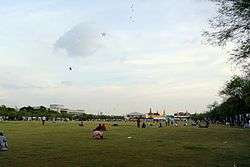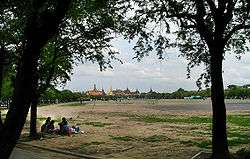Sanam Luang

Sanam Luang (Thai: สนามหลวง, lit: "royal turf") is a 74.5 rai[1] open field and public square in front of Wat Phra Kaew and the Grand Palace, Bangkok, Thailand. Sanam Luang is in the Phra Nakhon District, the historic center of Bangkok.[2]
In the Royal Chronicle it was written that, "In front of Wat Mahathat, Sanam Luang lies between the Royal Palace and the Front Palace. When royal cremation was held at the Phra Men Ground, the pyre set up in the centre with the Royal Palace Pavilion to the south and the one of the Prince of the Front Palace to the north. The music from the Royal Palace and from the Palace to the Front would be played on opposite sides of Sanam Luang".[3]
Sanam Luang was officially known as "Thung Phra Men" (the royal cremation ground) (Thai: ทุ่งพระเมรุ). It has been used as a site for the cremation of kings, queens, and high-ranking princes since the reign of King Rama I.
In 1855, King Rama IV changed its name from "Thung Phra Men" to "Thong Sanam Luang", in common usage now shortened to "Sanam Luang".
History

Sanam Luang has been used since the time of King Rama I. It was the site of royal ceremonies and functions, including the cremation of the Prince of the Palace to the Front, who was Rama I's brother. King Rama II followed this example of performing royal ceremonies there, including the cremation of the Prince of the Palace to the Front of his reign, who was also his beloved brother. The Royal Chronicles mention the close link between the two brothers as follows:
"At the beginning of the season of the tradewind, the king flew a Chula kite (star-shaped kite) in front of the Temple of the Emerald Buddha and the Prince of the Palace to the Front flew a Pakpao kite (plain kite) at Sanam Luang".
During the reign of King Rama III, when Thailand was engaged in a conflict with Vietnam over the Cambodian border, the king wished to demonstrate to other nations that Thailand was such a fertile, flourishing country that even the area in front of the Grand Palace was cultivated. Sanam Luang was then a normal plot of land, used for growing rice. When there was a royal funeral, it would be smoothed over to prepare for the event.
King Rama IV set up a place for performing the Royal Ploughing Ceremony and the Ceremony of Calling the Rain (Thai: พระราชพิธีพืชมงคลจรดพระนังคัลแรกนาขวัญ) where low walls were put up and a small hall was built to place the Buddha image for the ceremony. Pavilions and towers were built near the king's seat when he watched the ploughing ceremony. Next to the king's pavilion there was a stage where plays were performed as part of the ritual of propitiating the gods. Outside the wall there was a barn where the rice would be stored.
King Rama V enlarged Sanam Luang and pulled down all the buildings which were used for the ceremonies of former kings and it was no longer necessary to grow rice near the Royal Palace. The space was needed for the preparation of the Centennial Celebration of Bangkok in 1897 which took place soon after King Rama V's return from Europe. It was a grand celebration also corresponding to the king's fiftieth birthday. Sanam Luang was still the place for kite flying. King Rama VI again used the place in the same manner as former kings to perform various ceremonies. Also, it was used as a racetrack, and golf course as more foreigners came to visit and stay in the country.
.jpg)
The present king uses Sanam Luang annually on 11 March, for the Ploughing Ceremony and the Ceremony of Calling the Rain. There were various ceremonies performed at Sanam Luang, including the Bi-Centennial Celebration of Bangkok (Thai: พระราชพิธีฉลองกรุงรัตนโกสินทร์ครบ 200 ปี), in 1982, the grand celebration of the king's birthday (Thai: พระราชพิธีกาญจนาภิเษก) and the cremation of Queen Rambhai Barni of King Rama VII, in 1986.
The last cremation that took place there was for the King Rama VI's only daughter, HRH Princess Bejaratana Rajasuda in 2012.
Following the 13 October 2016 death of King Bhumibol Adulyadej, massive crowds flooded Sanam Luang to pay their respects to the late-king.[4][5]
The Fine Arts Department listed Sanam Luang as a historical site in 1977, announced on 13 December 1977, according to Royal Decree (book 94 part 126). The area of Sanam Luang is about 30 acres (74 rai 63 wa).
References
- ↑ "Royal pyre to be ready around September". Bangkok Post. Reuters. 21 November 2016. Retrieved 21 November 2016.
- ↑ "Sanam Luang". Tourism Authority of Thailand (TAT). Retrieved 19 November 2016.
- ↑ "Sanam Luang (Phramen Ground)". Geocities. Retrieved 19 November 2016.
- ↑ Wipatayotin, Apinya (2016-10-22). "Emotional outpouring in song at Sanam Luang". Bangkok Post. Retrieved 19 November 2016.
- ↑ "Crowds mass at Sanam Luang". Bangkok Post. 2016-10-22. Retrieved 19 November 2016.
Coordinates: 13°45′18″N 100°29′35″E / 13.75500°N 100.49306°E